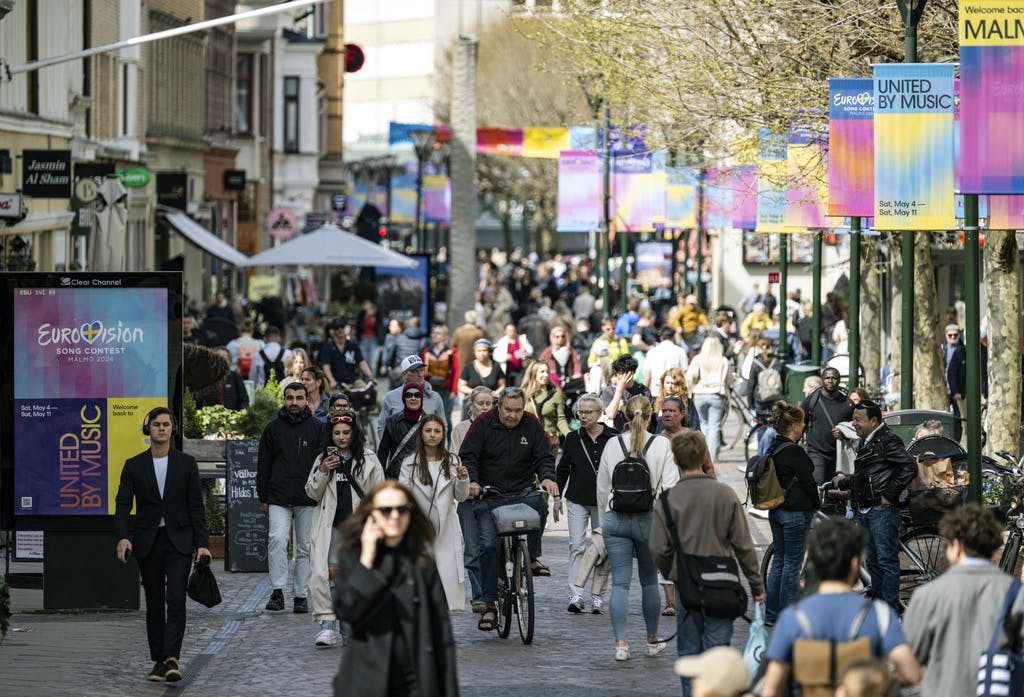Eurovision Contest Presents Extra Challenge for Israeli Singers, as It Takes Place at ‘Antisemitism Capital,’ Sweden’s Malmo
Israel’s national security council issues its second-most-serious travel advisory, warning citizens against visiting Malmo until the end of the contest on October 12.

Europe’s schlockiest, campiest kitsch-fest, the Eurovision song contest, will open next week at Sweden’s third largest city, Malmo, home to the continent’s largest Muslim community and owner of the dubious title “antisemitism capital.”
“Malmo’s commitment to diversity, inclusivity, and innovation aligns perfectly with the spirit of the competition,” Eurovision’s executive supervisor, Martin Österdahl, said when the city was chosen last year to host the contest. The slogan picked for the 2024 continent-wide televised event is “United by Music.”
Diversity, inclusivity, and unity, though, were far from the first impression of a team of television reporters and crew from Israel’s Channel 12 who visited the Swedish city two weeks ago to preview the song contest. The reporters, Ohad Hemo and Elad Simchayoff, were threatened, spat on, and physically assaulted once locals heard them speak Hebrew.
Israel’s national security council on Thursday issued its second-most-serious travel advisory, warning citizens against visiting Malmo until the end of the contest on October 12. The level 3 advisory was reportedly issued after “concrete intelligence” was gathered on terrorist plots to target Israelis during Eurovision week.
Those who travel to Malmo anyway are advised to download a specially designed app with updates on specific dangers expected during next week. Some Israelis did fly over to cheer on the pop star whose “Hurricane” was chosen to represent the country in the song contest, Eden Golan. Rather than staying at Malmo, though, most booked hotels at neighboring Copenhagen, Denmark.
Ms. Golan is reportedly holed-up inside a Malmo hotel, where she is rehearsing under the type of heavy security that is normally reserved for Israeli heads of state. “Hurricane” is scheduled to be performed on the second semifinals day, May 9. The winner of the contest will be chosen by a judging panel and a popular online vote, during next Sunday’s Grand Finale.
Ms. Golan was forced to change the lyrics of her original song after contest authorities deemed them too political. Titled “October Rains,” that first version referred to that month’s massacre in southern Israel. Ukraine’s “Stefania” became a war anthem after winning the 2022 Eurovision, yet Ms. Golan was warned that unless the lyrics changed, Israel would be disqualified from the contest.
Several vague references to October 7 remain in the English-language “Hurricane,” including this verse: “Someone stole the moon tonight/ Took my light/ Everything is it black and white/ Who’s the fool who told you boys don’t cry.”
The Eurovision contest is better known for breezy, at times nonsensical pop lyrics than for deep poetry. In its 67-year existence, it has launched some huge hits and spectacular careers: Two British pop legends, Lulu and Cliff Richard, got major boosts from their participation.
Italy’s Domenico Modugno’s “Nel blu, dipinto di blu” barely made Eurovision’s third place in 1959. Yet, the song, also known as “Volare,” became a favored re-recording number, sung by artists as varied as Dean Martin, the Gypsy Kings, and David Bowie. Sweden’s most successful musical band, ABBA, burst on the pop scene with “Waterloo,” which won the contest in 1974.
Israel first won the Eurovision competition in 1978, with Yizhar Cohen’s “Abanibi” — a tribute to Hebrew’s equivalent of pidgin English. The country emerged victorious three additional times, including in 1998 with “Diva.” Its singer, Sharon Cohen, better known by her stage name Dana International, was the first transgender artist to win the contest, becoming a worldwide LGBT darling.
In 2021, this year’s Eurovision host, Malmo, hosted an LGBT pride parade. Yet, Sweden’s image of gentility and tolerance are far from what the city of Malmo is known for — especially since it became a favored landing spot for migrants who flooded Europe during the civil war in Somalia and last decade’s mayhem known as the Arab Spring.
Muslims are now more than 20 percent of Malmo’s population of 300,000, making it arguably Europe’s premier Muslim city. After a man burned a Koran at Stockholm, Sweden’s anger and rioting were most intense at Malmo. Jewish institutions are often targeted for vandalism and violence.
Sweden now leads Europe in gun-related crimes, and Malmo is often cited as its top hub of gang-related activity. The city’s Rosengard district has long been described as a police “no-go” zone.
Israel’s travel advisory follows a similar warning initially issued by the Simon Wiesenthal Center in 2010 and that has been repeated annually ever since: Stay out of Malmo. Even as antisemitism is swelling around the world in October 7’s aftermath, Ms. Golan will sing “Hurricane” right there, in the eye of the storm.

